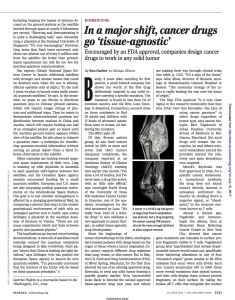Зарегистрируйтесь на getAbstract, чтобы получить доступ к этому краткому изложению.

Зарегистрируйтесь на getAbstract, чтобы получить доступ к этому краткому изложению.
Ken Garber
In a Major Shift, Cancer Drugs Go ‘Tissue-Agnostic’
Encouraged by an FDA approval, companies design cancer drugs to work in any solid tumor
Science, 2017
Что внутри?
Novel drugs defeat cancer cells by targeting their flaws like magic bullets.
Recommendation
Ken Garber reports on a breakthrough in the treatment of cancer. He explains so-called “tissue-agnostic” drugs in thorough detail, proving his longstanding experience as a science writer. He uses complex medical terms to discuss biomedical mechanisms and drug development. However, he manages to break down the essential information for a general audience. getAbstract recommends this article to anyone interested in new developments in cancer treatment.
Summary
About the Author
Ken Garber is a science writer in Ann Arbor, Michigan with longstanding experience covering biology and medicine. He has written for Science, Nature, Nature Biotechnology and Nature Medicine. He is also a contributing correspondent for the Journal of the National Cancer Institute.



















Comment on this summary